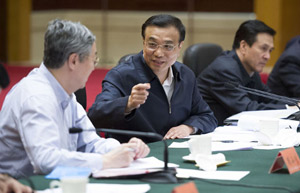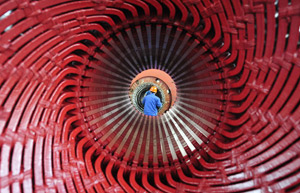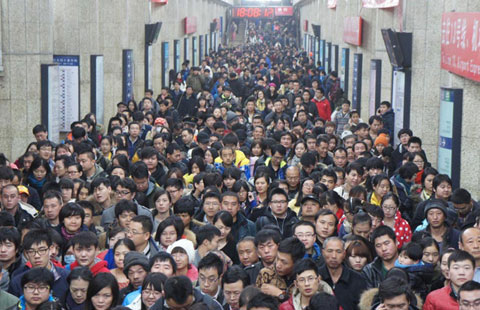Chinese economy resilient enough to refute worries
(Xinhua) Updated: 2014-04-17 10:38BEIJING -- The slowdown of the world's second largest economy has prompted some concerns, but many of those worries are unwarranted in view of China's commitment to economic restructuring.
Official data released Wednesday by the Chinese National Bureau of Statistics showed that China's GDP grew by 7.4 percent year on year to 12.8213 trillion yuan ($2.08 trillion) in the first quarter.
|
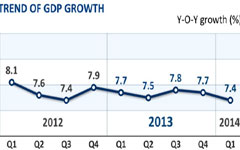 |
|
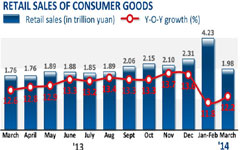 |
Some analysts claimed that China would turn back to stimulus and give up reform as a result of the slowdown. Some others even argued that the Chinese economy would slide down uncontrollably into an abyss and doom its trading partners.
"By using its old trick of spending its way to growth, the mainland runs the risk of falling deeper into its complicated structural problem," said Geogre Chen, a columnist with the Hong Kong-based South China Morning Post.
As a matter of fact, such voices, eloquent as they may sound, cannot dim the outlook of the Chinese economy, whose future is decided by nothing but the combination of the country's economic policy and fundamentals.
Christine Lagarde, managing director of the International Monetary Fund (IMF), said recently that the Chinese economy will not see a rapid dip and that the Chinese government is serious and determined to implement the reform.
President of the World Bank (WB) Jim Yong Kim also said recently that despite the recent slowdown the Chinese government's resolve to restructure its economy is impressive.
"The risk is not slower growth," said Markus Rodlauer, the IMF's mission chief for China and deputy director of the fund's Asia and Pacific Department. "The risk is that growth is not allowed to slow."
"A series of economic policies ... show that China's new leaders mean business with their commitment to reform," said Forbes in an article published on its website last week.
The Chinese officials in charge also responded to allay the worries. Chinese Vice Finance Minister Zhu Guangyao said on the sidelines of the IMF and WB's spring meetings in Washington that China will not roll out a massive stimulus package just for short-term gains.
"The message that China is determined to endure short-term economic pain to press ahead with structural reforms is likely to encourage economists who say China needs to move quickly to wean its economy from runaway credit, over-investment and excess capacity," said a Wall Street Journal article published Saturday on its website.
In terms of RMB's exchange rate, Lagarde defended China, saying that the latest increasing fluctuation of the yuan is a step towards the currency's internationalization, rather than the so-called deliberate depreciation.
Experts say that as China carries on its reform, the ongoing economic slowdown should be taken by the international community as a necessary step in the restructuring of its economy for further development, rather than as any signal of stagnation or even shrinking.
|
|
|
- China's FDI inflow down 1.47% in March
- Lenovo to build 2,000 smart-TV stores
- Austrian fashion houses dazzle Beijing
- China's rare earth firm Q1 profit slumps 70%
- Sinopec to pay $1.2b for stakes in Lukoil projects
- US urged to 'understand' yuan issue
- Thinking big and caring big in FMCG market
- Many Chinese firms looking overseas: Poll
